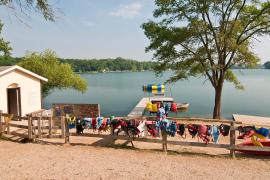Social media platforms are an essential part of many people’s lives.
Using social media is an excellent way for youth to stay connected to their families and friends and to access general information. Youth can maintain social connections and support networks that otherwise wouldn't be possible and access more information than ever before. The communities and social interactions youth form online can be invaluable for bolstering and developing young people's self-confidence and social skills.
However, there have been increased instances of minor exploitation and an alarming trend of youth creating exploitative content of themselves and sharing it online with adults or other children. Due to COVID-19, youth and adults are online more than ever, often unsupervised in the same space. Youth and parents should stay alert — people aren’t always who they seem in online environments where identity is easy to fake. In 2021, the National Center for Missing and Exploited Children’s CyberTipline received 29.3 million reports of suspected child sexual exploitation, an increase of 35 percent from 2020.
The “rule of three” specifies that there should always be at least three people present — for example, one employee and two or more children, or two employees and one child (An adult volunteer may be included in the “rule of three” when it includes an employee with a child). How can we keep our youth, students, campers, camp staff, and adults safe in the virtual world by utilizing the rule of three? According to Quixy, between 2020 and 2022, virtual meetings grew from 48 percent to 77 percent. As trusted, loving adults, we generally do everything we can to keep our youth safe and well — from not getting sunburned to being hydrated during the hot summers. But what are we doing to protect them from bullies, predators, and inappropriate content online?
We have all been there before when it comes to over-posting about our latest meal, a new purchase, or a family getaway trip. Our youth sometimes post information on social media that could make them targets for online predators. Youth must be aware and use caution; they should not share their real name, date of birth, school name, hobbies, interests, or tag their location, etc. It’s important to discuss the potential risks of oversharing with your child. Posting details about being home alone may seem harmless, but such information could endanger them. The same applies to telling online friends about vacations and virtually advertising when your home will be unoccupied. Kids may not understand that a simple post asking for a phone number may be from an evil source. Discussing various scenarios, you can help your child understand what kind of information should not be shared via social media.
Let’s face it, the internet and social media are here to stay. Talking regularly with our youth is the greatest tool to help keep them safe online and on social media. Making it part of daily conversation — as you would talk about their day at school or camp — will help youth to feel relaxed. It also means that when they do have any worries, they'll be more likely to come and speak to you.
You can protect youths’ privacy by:
- Discussing how the internet is forever
- Establishing social media rules for the whole family
- Monitoring your youth’s social media accounts
- Guarding their location on social media
- Using parental controls
- Looking for signs of distress
- Taking breaks from social media when needed
- Setting a good social media example
- Set boundaries
- Keep devices out of bedrooms
- Set boundaries
The world of social media is constantly changing. New platforms arise out of nowhere and become all the rage before anyone not part of the movement can learn what's happening or trending. This space is where the risks are the highest; it's an unknown environment. In the end, the shape-shifting nature of social media means you need to remain vigilant so you can find new threats when they emerge. Talk with your kids and devise a plan that works for everyone and makes safety the top priority.
If kids are surfing the internet or are on social media, you need to be paddling right alongside them (or at least observing carefully from the shore). While the internet offers excellent entertainment such as games, current events, and connecting with loved ones, the internet and social media can also harm your youth’s physical safety and emotional well-being.
For more information about Camp HOPE America, please visit us at camphopeamerica.org and follow us on all social media at Camp HOPE America.
Jamal Stroud, PhD, provides oversight of all mentoring and outreach components of Camp HOPE America. In 2017, Jamal founded Big Homie Lil Homie (BHLH), a nonprofit mentoring program for young boys growing up without father figures. Jamal is also a motivational speaker who prioritizes children and the overall improvement of character.
lakshmiprasad S/iStock via Getty Images
The views and opinions expressed by contributors are their own and do not necessarily reflect the views of the American Camp Association or ACA employees.




